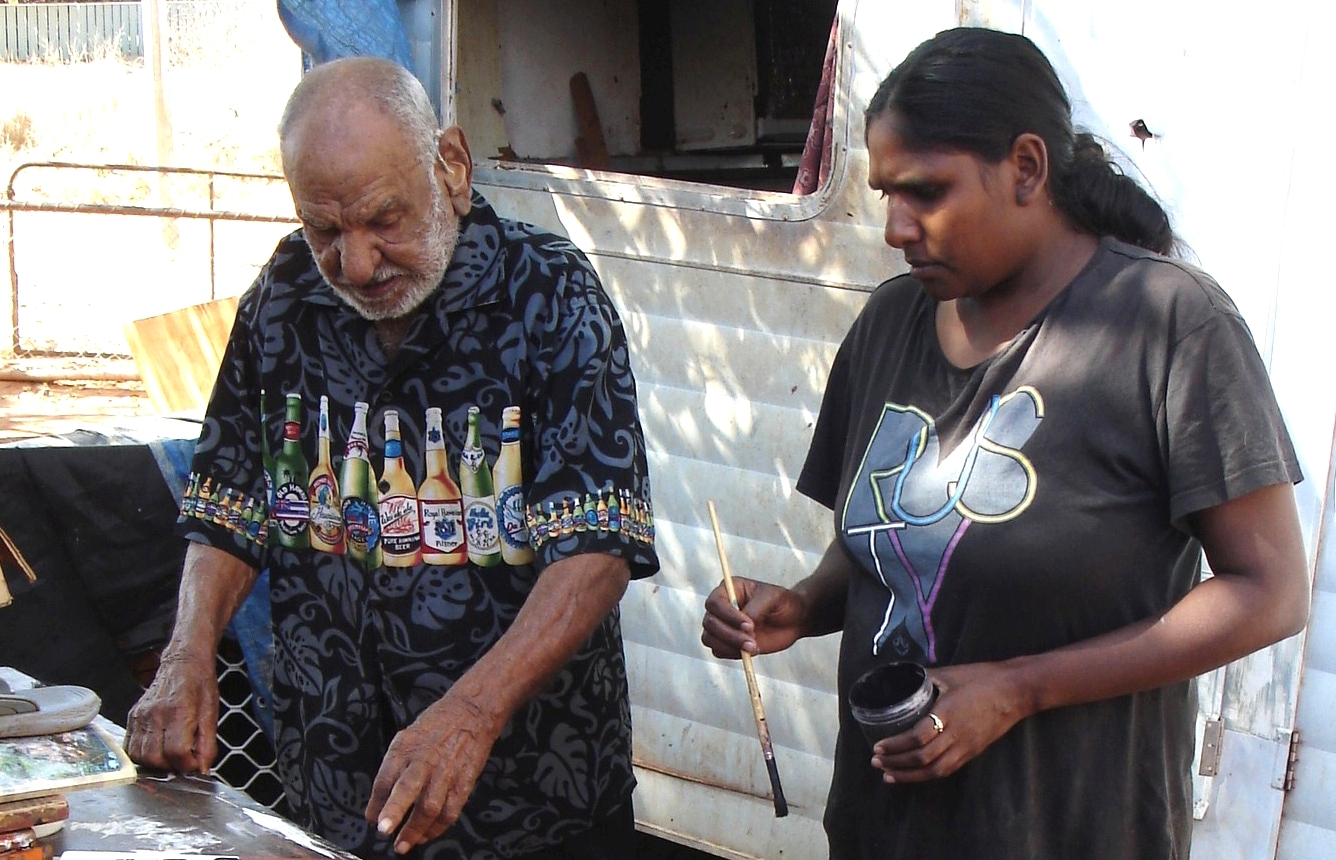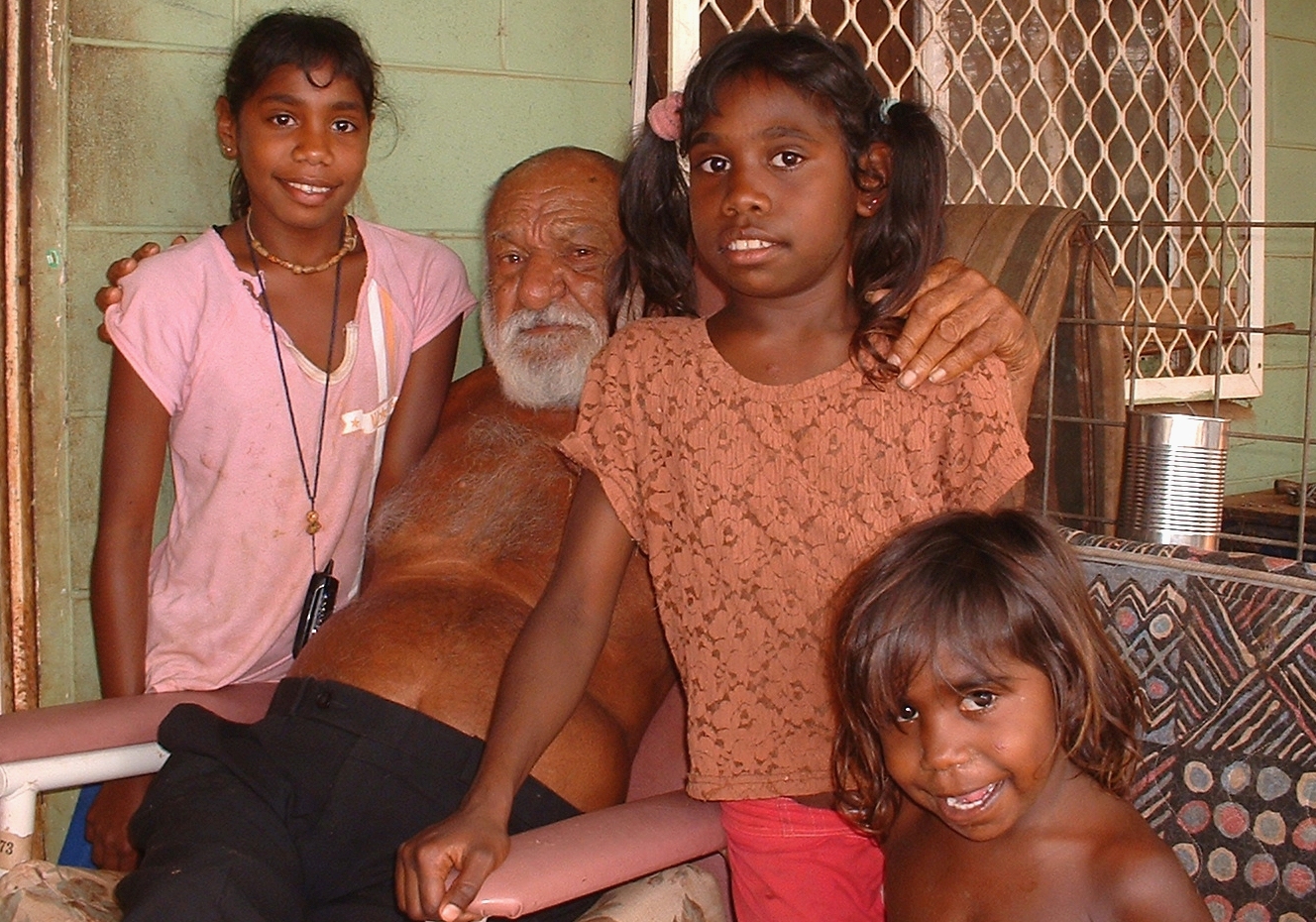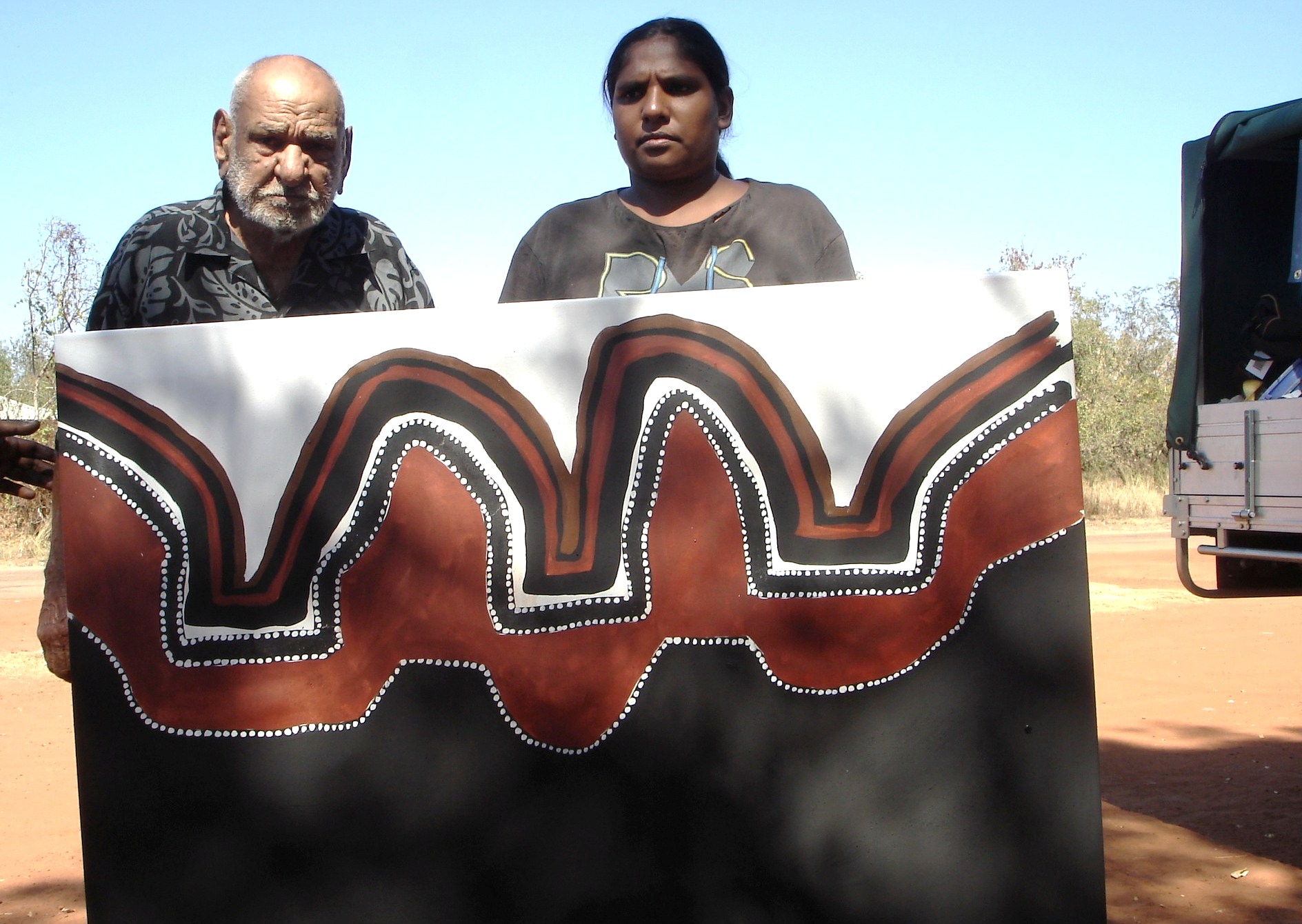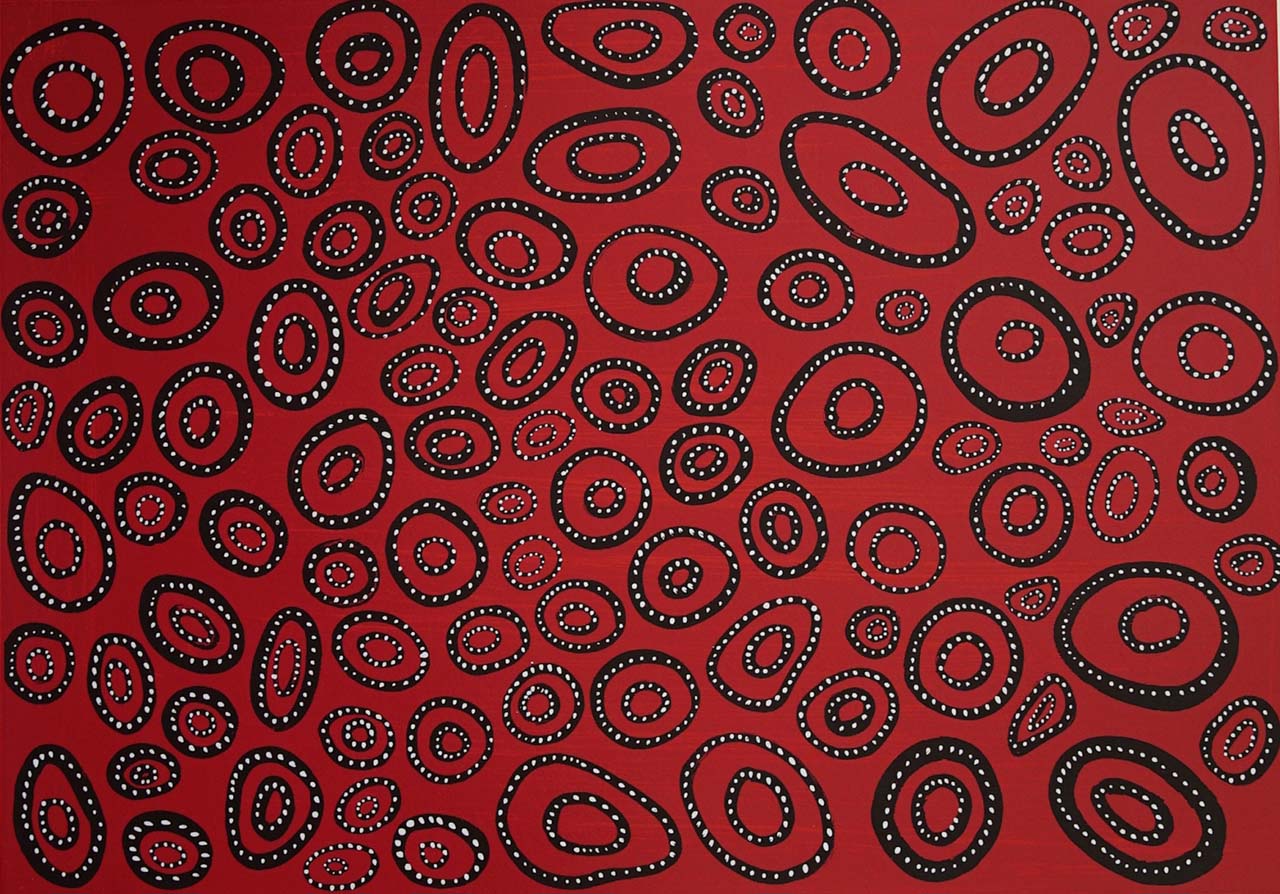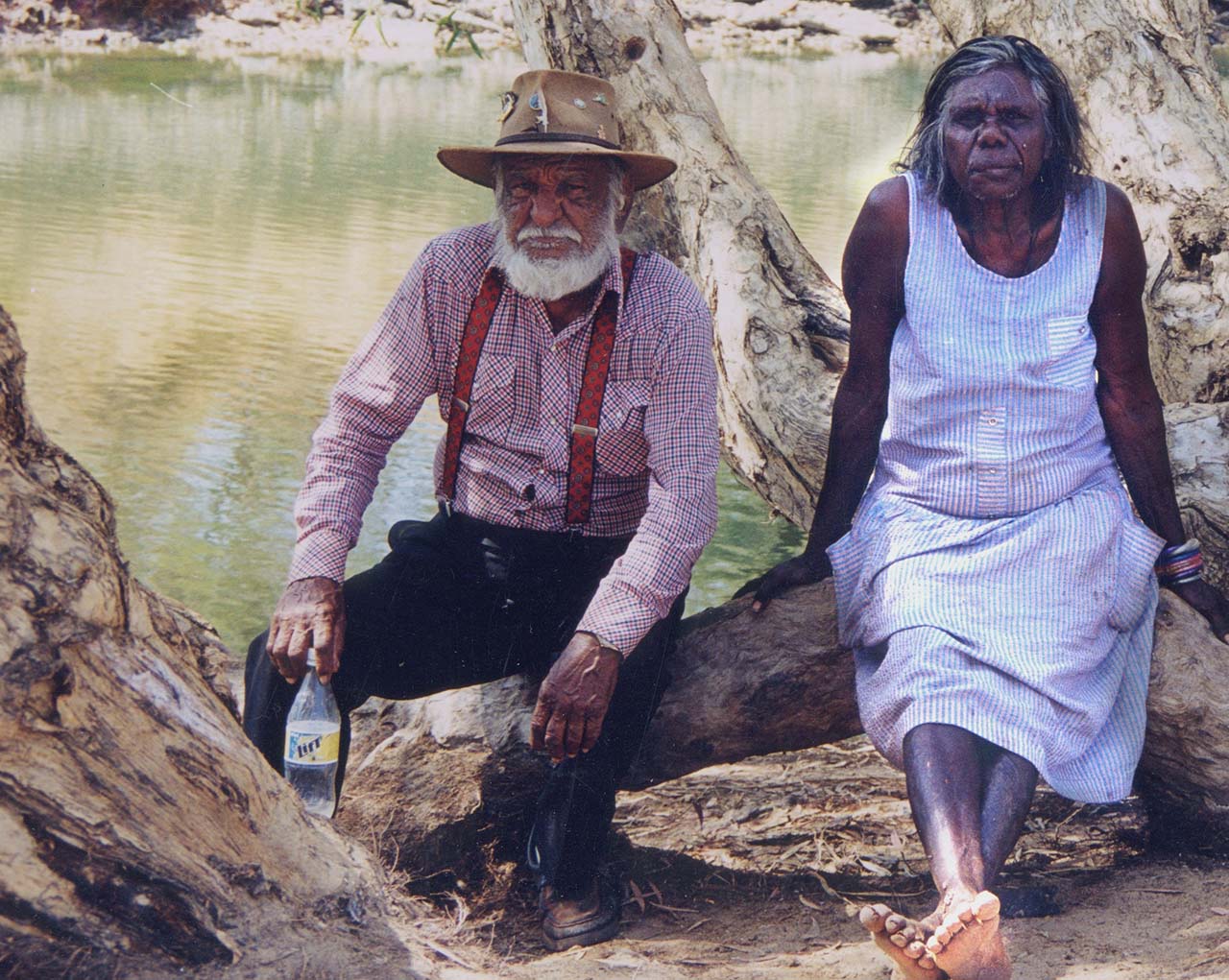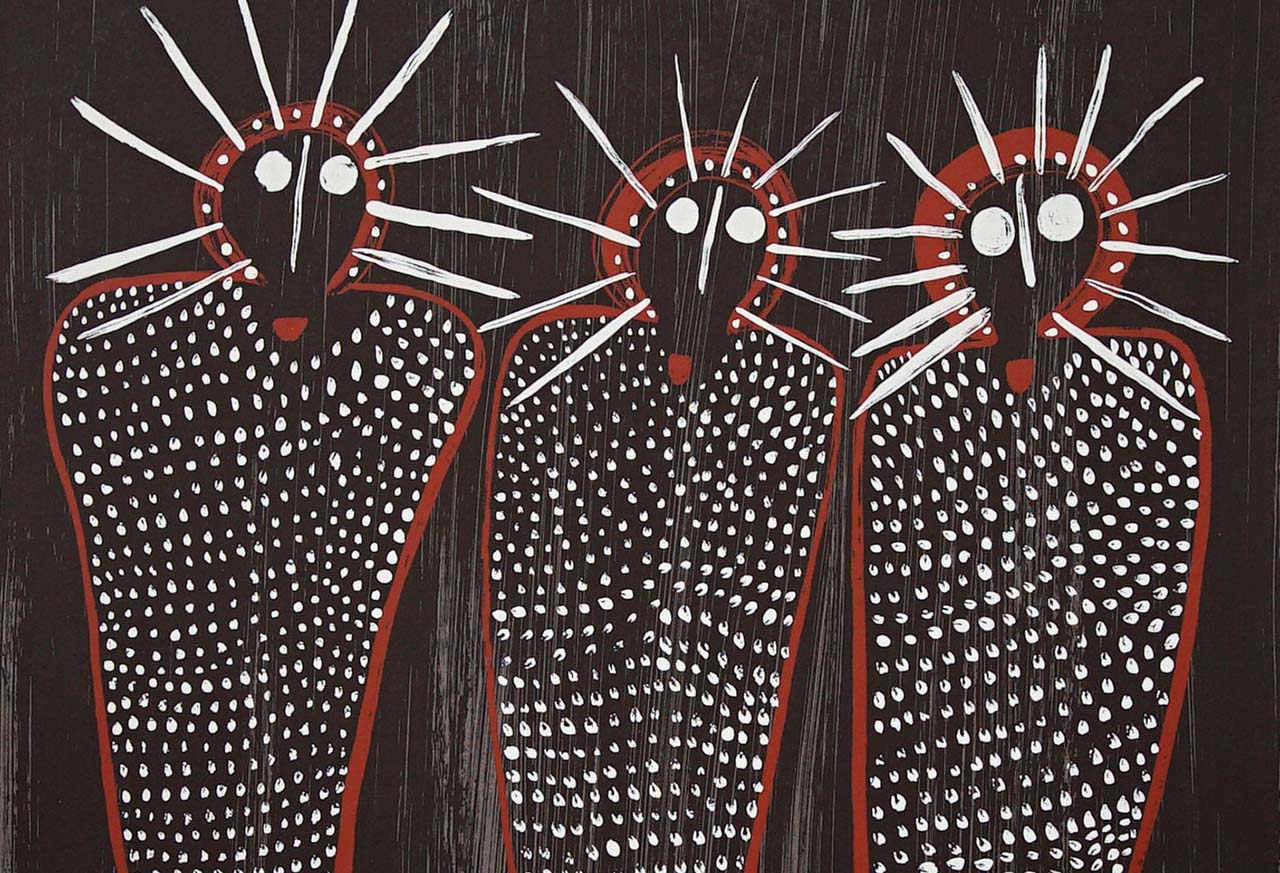What My Father Jack Dale Taught Me
In this interview, Kimberley artist Edna Dale talks about her famous father, the artist Jack Dale Mengenen.
About Jack Dale, Jack was born with European/Indigenous parentage at a time when this was unacceptable within both cultures. Jack’s mother hid him from the welfare workers who routinely removed mixed-race children from their families. Jack grew up in the country with his mother learning the traditional ways of her family. He started to paint in his seventies exploring themes of traditional knowledge and culture and painting the Creation spirits, the Wandjina.
About Edna Dale
In this interview, his artist daughter Edna Dale talks about her father and how he encouraged her to paint and keep those stories alive. Edna still lives on her traditional land, painting and encouraging others to use art to tell their stories and keep their culture strong. She has a seventeen-year-old daughter Petrina, also an artist, who is carrying this painting tradition on to a third generation
A Hard Life
Edna, your father had an incredible life. When you meet young people who don't know about him, what's the story that you tell when they say, "Who was Jack Dale?”
I tell them a lot of stories, the history. What really went on. What he told me. I try and carry it on, too, with my paintings.
How do you describe him as a man?
I think Dad was a rough fellow. He grew up very hard, and he tried to be hard with me, too. Being the only daughter, I think that he had to. With Dad's life, it was very hard growing up in the old days. He used to tell me a lot of stories about his father and his mother. You know, European and the Natives. He wanted to love his father. He also loved his mother. He used to tell us about the welfare patrols and the treatment of half-castes and all that. I look at people now and it's so hard to believe all that happened. People sometimes think life was easy back then, you know? It was a hard life. These people grew up hard.
I think Dad just put everything into painting his story. If anybody asks me, "Who's Jack Dale?" I go, "That's my Dad!" I've got a lot of history. I have a book and I say, "You want to know about my father? Look at this book. It’s at our Art Centre." They tell me, "Gee, your father was a very strong man," and I'm proud. Some people ask me back home, "Is it okay to say his name?" I say, “Well, for me it's okay because I don't want my father to ever be forgotten. I want him always remembered.”
Your father came to painting quite late in his life?
Yes, in his 70's, I think he started painting because all he wanted to do was sit back and relax. He had this good memory inside of everything in the past, what happened.
Do you remember when he started painting?
Yes, about seventeen years ago when Petrina was only a baby.
A Father’s Influence
Did he talk to you about the art?
Yeah, I'd sit there and he'd tell me, "Come on Edna. You got to come over here. You got to help me do this and that," and I'm saying, "But Dad, I don't even know how to paint." It was like that. I didn't want to do paintings because I thought if I'm going to touch the brush and do paintings, I might just muck it all up. I didn't even know how to do a Wandjina back then.
Coming to exhibitions with Japingka, with Dad and I'll be just looking at the paintings thinking, "I don't think I'll ever paint a Wandjina in my life." That was in my early 20’s. I didn't really know what the future was going to bring me. As I was growing older, I stayed with my Mum and Dad and with Petrina and the other kids.
I think growing up and just watching, keep watching, and we learn. He’d always tell me, "Come on, Edna. Let's go do some paintings.” I wouldn't say no or yes. I'd just come and put the brush out, the canvas, and then he'll start doing his paintings and he'll say, "Can you straighten it up for me?" I'm like, "But Dad, I don't know how to do it." It was always Dad pushing me to do the paintings and to help him. He got me to where I am today, I think.
Was he telling you the stories of the Wandjinas?
Yeah. A lot of stories. Mainly the stories of Imintji and Bell Gorge. That's our traditional area because he always told me, "We can't claim other people's land. We have to stick to our own stories and our own Wandjinas." That was the main part.
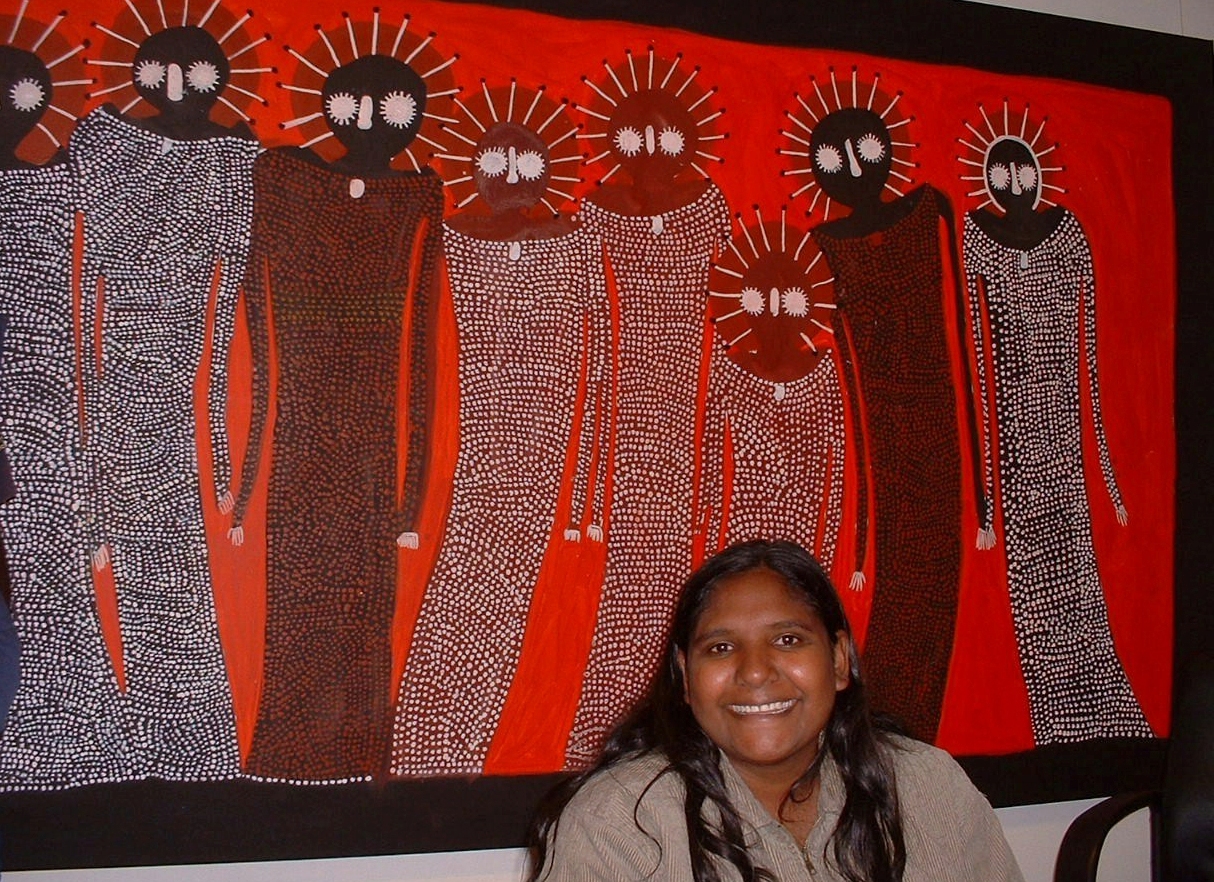
A Medical Crisis
Can you talk a little bit about that growing confidence and the things that helped you move forward as an artist?
I think the main thing that pushed me was when Dad had the fall and broke his hips. He came down to Royal Perth Hospital. It was a big experience to come all the way with him, to be with him and to see him suffer. I said to myself, I have to make him happy. Then I started painting.
Sometimes I’d finish a painting and I’d think, "Is that really mine?" I'd be shocked myself because I wouldn't really think I'd be able to do it, you know? I can't believe it's my Wandjinas. Then Jenny Wright, the Manager at Mowunjum Arts Centre, would come and say to me. "Come on, Edna. I need some more of those Jack Dale's daughter's paintings." Then I'd do so much, and then she'd encourage me, "Oh, Edna, come on. Keep going.” You know the Art Centre has been very supportive of me, especially after Dad passed. They helped me through a difficult time. I’m so grateful for that.
How did your father react when he started seeing your paintings?
Oh, Dad was so proud to see them. He said, "You keep going now because I don't think I'm going to be here very much longer.” He was already at the nursing home. Being at the nursing home really made him down. I knew I had to make him happy. Every time I'd do a painting back home at Imintji, I'd bring some in and show him what I was doing. I'd tell him that at Imintji were going to have our own Art Centre and how things were still going back home. It really made him so happy and proud.
A Family Painting Together
He had quite a surprising new lease on life at some point there, didn't he? Can you tell us about what happened?
When he moved to the nursing home the carers knew that he was an artist. They spoke with a gallery owner in Derby called Mark Norval. Mark told the carers they could bring Dad at any time. Dad started doing his paintings there. I'd come in from Imintji, we'd all meet up at the gallery. Every time Mark would see us as a team. Me, Petrina and Dad would all be on a table sitting down and doing the paintings. We'd always be together because Petrina started when she was 4 years old. "Come on, Petrina. We're going to get going. Do this, do that."
I wasn’t going to be an artist, but then I saw Dad. I saw how he was down and then how he picked up when he saw us doing the paintings. I said, "I've got my own art exhibitions." Also when he knew I was going to the Revealed Artists, I showed him all my paintings. He was just happy. Just to know that he was happy inside meant a lot to me.
When did you start to actually accept that you're an artist?
I think it was in 2012. I've always helped Dad and probably seeing him and telling me all our stories, I picked it up inside.
Dad has been a big influence. He inspired me in a lot of ways through art. I reckon if it wasn't for Dad, I wouldn't even be sitting here. In that way and I'm happy because I could still carry it on. To myself, I was thinking if I don't do the art, there would be no more stories. I had to carry Dad's name because he's got a really big name in Derby through his art.
My paintings are about that connection to our home. To Imintji, Bell Gorge. That strong connection to the past. All our knowledge was learnt. We learnt it from my Dad. I have to carry it on, otherwise, it will be lost. He'd always tell me, "You've got to be an artist. Always. You've got to start painting. Don't stop.”
Preserving The Stories
Not everyone in your community feels able to paint do they?
A lot of Aboriginal people, they're ashamed. That’s how I felt too when I was young.
It seems you’ve been motivated to overcome that in order to preserve the stories of your father?
It could have been lost so that's why I had to carry it on. Just to keep that painting and our story alive. He'd always talk about our homeland, Imintji.
The Imintji Community
Edna, can you tell me about where you live and your life there?
It's like 220 km from Derby, and I'm the Chairperson, the Director, and the traditional owner, and then I've got 7 girls to look after. Then I've got to care for my Mum at the same time. My Step-mum. It's really a big responsibility at home.
How many people live where you live?
I’d say now there are about 50 people in our community. The Art Centre's part of that little community.
Do you get out onto country very often?
Yes, we go out hunting or fishing. Mainly when I have my spare time.
Do any members of the community still gather bush tucker? Is that still relevant to them?
Yeah, we’ve still got a lot of bush tuckers back home. A lot of stuff out there. We've got these little green plums now. It happens during Christmas time. They're little green plums, and they're really sweet for the kids. They can just put a bucket, shake the tree, fill it all up, go home, they crush them up, and then mix it with a little bit of sugar.
Are there yams and vegetables out there?
Yeah. There's a lot of food.
Art Benefits Community
I wondered if you wanted to talk about the ways that art practice benefits Indigenous communities.
Having an Arts Co-ordinator like Rosie helps a lot. She’s a good teacher. We really like Rosie. She'll just come out to visit us at Imintji. We talk, and tell yarns and enjoy a laugh. We just do our art and we talk about things. It's really good.
We're trying to build the Imintji Arts Centre slowly. It's only a little small donga (portable building) we had in the community. It’s a little project for our community fellows. They’ve just redone it, painted it up, did the floors, and now it looks so new. I cannot believe it myself.
Imintji put up its own money so we could have our own Art Centre. I tell all artists, I encourage them, come to Imintji. Do some paintings, and it will help them and their family. It's all about trying to get other people involved. We give our own people most of the money made from sales. We only keep 5% of sales for the Art Centre itself.
Being part of the Art Centre has really made us understand more about the tourists who come in and what they enjoy. I could see that they need to understand the story. They need to meet the artists as well. I'm always at the Arts Centre. I try and tell them about everybody's stories.
Because I'm there, they would just want to buy my paintings. They enjoy meeting the artist. I try to encourage everyone else in our community to come and get involved. I support the other artists too. I don’t want to just be selling my own work. I'd like them to buy other member's of the community's work too.
What sort of questions do visitors ask you?
Visitors to the Art Centre sometimes ask why the Wandjina doesn't have a mouth. I say well they are spirits. Sometimes I'm confused myself. It’s the way they’ve always been. That’s how Wandjinas are formed in the caves. That’s just how our ancestors left them. All Wandjinas don't have a mouth.
Visit To See The Ancient Traditional Art
What do you feel when you go to those ancient rock paintings?
You could feel that presence of the ancestors in the caves and in art, they've done. I only flew around to see the rock art about 3 or 4 years ago with Dad. He showed me how Wandjinas are carved into the rock. It was so moving, like, "Ahh." To see them still there after all those years.
It was like a gift, just seeing it. You could touch it. Your old people, the ancestors. It was just right up inside an open cave. I saw that with my Dad.
Three Generations of Contemporary Painters
What would Jack Dale think about this exhibition?
I reckon if he was here he'd be really proud to see me and Petrina together as artists and seeing our Wandjinas. I can just see his face. Just smiling and happy. That's something I did for Dad is to carry his stories on because he had a big name, you know. Everybody knew who Jack Dale was.
Read more:

